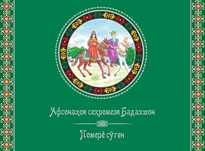Kyrgyz Funeral Laments and Lamenters
This book presents a comprehensive ethnographic study of the singing of koshok (funeral lamentations) among elderly Kyrgyz women. Koshok is one of the oldest and most enduring genres of Kyrgyz oral poetry. The book includes koshok texts recorded by the author in different regions of Kyrgyzstan in 2003, 2011 and 2013, categorised according to theme and topic. It also includes descriptions of the author’s research methodology and a rare glimpse into the experiences of recording this sensitive ritual.
The author’s discussions of koshok includes excerpts from dozens of interviews with Kyrgyz women who share their own views on and experiences of singing koshok, including concerns over the waning significance of the ritual in modern Kyrgyz society. An accompanying DVD contains over 30 audio examples of koshoks sung by professional lamenters, as well as video footage of Kyrgyz rituals and customs during memorial feasts offered to the deceased. Drawing on the author’s original photographs and audio-video materials, the book aims to attract a wide range of readers, including scholars, students, those interested in Kyrgyz culture, and the principal tradition bearers of koshok singing, Kyrgyz women and aqyns (oral poets).
The book can be purchased from University of Central Asia’s Cultural Heritage and Humanities Unit. For more information, please contact chhu@ucentralasia.org.
The short film; Kyrgyz Herders | Funeral Laments is based on the narratives of two books in the University of Central Asia’s (UCA) Cultural Heritage Book Series: Kyrgyz Herders of Soviet Uzbekistan: Historical and Ethnographic Narratives by Dr Elmira Köchümkulova and Mamatkerim Köchümkulov, and Respect Graces the Living, Lamentation Graces the Dead: Kyrgyz Funeral Laments and Lamenters by Köchümkulova. It tells the story of two custodians of Kyrgyz nomadic traditions – herders and funeral lamenters (koshokchus).
“A farmer stops ploughing when it rains. A herder stops herding when he dies,” says a herder highlighting the centrality of livestock in the rhythms of Kyrgyz life. The film recounts the unique experiences of Kyrgyz herders in Soviet Uzbekistan from 1941 to 1995, including relations between nomadic Kyrgyz and sedentary Uzbeks of the Fergana valley and the role of Kyrgyz women.
Funeral laments (koshoks), one of the oldest genres of Kyrgyz oral tradition, are in danger of being lost to influences of fundamentalist Islam, rapid urbanisation and globalisation. Subtitled performances by koshokchus in the video highlight the unique tonality and complex verses of koshoks.
“To ensure our heritage is part of contemporary discussions on culture and identity we must engage with culture as a living being, practiced and adapted by people; people like these, who generously participated in this video,” said anthropologist and author Kochumkulova, Director of UCA’s Cultural Heritage and Humanities Unit.
These publications were generously supported by The Christensen Fund and the University of Central Asia, and the film produced by Elyor Nematov.








